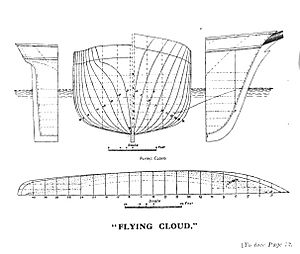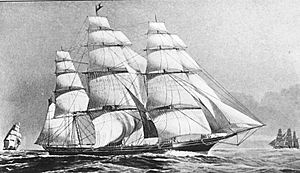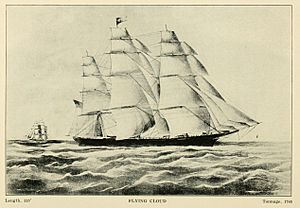Flying Cloud (clipper) facts for kids
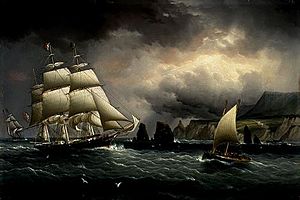
The Clipper Ship "Flying Cloud" off the Needles, Isle of Wight 1859–1860, by James E. Buttersworth
|
|
| History | |
|---|---|
| Owner | Grinnell, Minturn & Co, New York |
| Builder | Donald McKay of East Boston, Massachusetts |
| Cost | $90,000 |
| Launched | 1851 |
| Owner | James Baines & Co., Black Ball Line, Liverpool |
| Acquired | 1862 |
| Owner | Harry Smith Edwards, South Shields, England |
| Acquired | 19 April 1871 |
| Out of service | 1875 |
| Fate | Went aground, Beacon Island Bar, Saint John, New Brunswick, 1874; burned for iron and copper fastenings |
| General characteristics | |
| Type | Clipper |
| Tonnage |
|
| Length |
|
| Beam |
|
| Depth |
|
| Notes | US and UK measurements differ as measuring systems had slightly different rules. |
Flying Cloud was a very fast clipper ship. Clippers were sailing ships built for speed. Flying Cloud set a world record for sailing from New York to San Francisco. She made the trip in just 89 days and 8 hours. This amazing record lasted for over 130 years!
Flying Cloud was built by Donald McKay, a famous shipbuilder. She was known for a close race with another ship called Hornet. She also had a woman navigator, Eleanor Creesy, who helped set her records. Later, Flying Cloud carried goods to Australia and timber (wood) for building.
Contents
Building a Speed Machine
Flying Cloud was built in East Boston, Massachusetts. She was first meant for a company called Enoch Train. They paid $50,000 to build her. But while she was still being built, another company, Grinnell, Minturn & Co., bought her for $90,000! This was a huge profit for Enoch Train.
A newspaper reporter in 1851 wrote about how big and fast Flying Cloud looked. He said she was 225 feet long on deck and 41 feet wide. Her design, with a long and sharp shape, was made for incredible speed. Many of Donald McKay's ships, including Flying Cloud, were called "extreme clippers" because they were so fast.
Setting a World Record During the Gold Rush
Just six weeks after being launched, Flying Cloud began her famous journey. She sailed from New York, went around Cape Horn (the southern tip of South America), and reached San Francisco in 89 days and 21 hours. Captain Josiah Perkins Creesy was in charge. During this trip, she sailed over 992 nautical miles in just three days!
In 1854, Flying Cloud broke her own record by 13 hours. This new record stood until 1989! That's when a new type of boat, the sloop Thursday's Child, made the trip in 80 days. Later, in 2008, the French racing yacht Gitana 13 broke the record again, taking only 43 days.
In the early days of the California Gold Rush, it took ships over 200 days to travel from New York to San Francisco. Flying Cloud's trip of only 89 days was a huge deal! It cut the travel time by more than half and made headlines around the world.
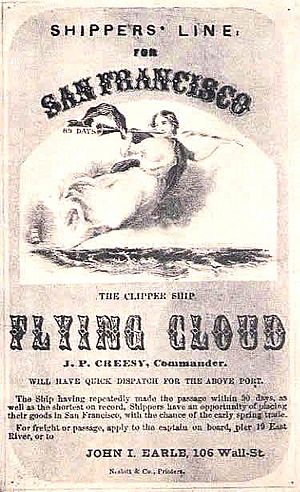
Flying Cloud vs. Andrew Jackson
For a while, people argued about which ship held the record. Some thought the clipper Andrew Jackson was faster.
Andrew Jackson reached the San Francisco pilot area in 89 days and 4 hours. This was faster for reaching the entrance to the harbor.
However, Flying Cloud holds the record for the full journey, from anchor to anchor, in 89 days and 8 hours. So, it depends on how you measure the trip!
Flying Cloud's amazing achievements were even more special because her navigator was a woman, Eleanor Creesy. She had studied ocean currents, weather, and stars since she was a girl. Eleanor was one of the first navigators to use the new ideas from Matthew Fontaine Maury, who wrote important Sailing Directions.
Eleanor and her husband, Captain Josiah Perkins Creesy, traveled thousands of miles together. They sailed all over the world, carrying people and goods. After their record-breaking trip from New York to California, Eleanor and Josiah became famous. But their fame didn't last long, and their story was soon forgotten. Josiah died in 1871, and Eleanor lived far from the sea until she passed away in 1900.
Race Against Hornet in 1853
In 1853, Flying Cloud had a famous race with another clipper called Hornet. Hornet left New York for San Francisco on April 26, 1853. Flying Cloud left two days later.
After sailing about 15,000 miles around Cape Horn, both ships arrived in San Francisco harbor almost at the same time! Hornet reached the harbor just 45 minutes before Flying Cloud.
Later Life and Loss of the Ship
In 1862, Flying Cloud was sold to the Black Ball Line in Liverpool, England. She kept her name and sailed under the British flag. She traveled between England, Australia, and New Zealand. Later in her life, she carried logs (wood) between England and Saint John, New Brunswick, Canada.
On June 19, 1874, Flying Cloud ran aground (got stuck) on a sandbar near Saint John, New Brunswick. She was too damaged to be repaired and was sold. The next year, in June, she was burned. This was done to get the valuable copper and iron parts from her hull.
A Ballad About a Different Flying Cloud
There is a well-known song, or ballad, about a ship named Flying Cloud. This song tells a story about an Irishman forced to sail on a ship that became a pirate ship. The crew in the song was later executed. However, this ballad is not about the real clipper ship Flying Cloud that set sailing records. It's a different story entirely!
Images for kids


